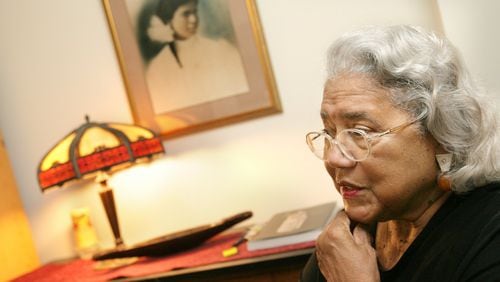It was almost 70 years ago, but June Butts still recalls when her father, black civic leader John Wesley Dobbs, rode through the Deep South with a white journalist in search of a story.
In 1948, Ray Sprigle, a white reporter for The Pittsburgh-Post Gazette, tanned his skin as dark as he could in the sun and dressed in tattered clothing to spend a month disguised as a black man. Dobbs had agreed to serve as his escort, introducing him to blacks in Atlanta, other parts Georgia and the Mississippi Delta. At the time, the mission was secret — Dobbs agreed to participate on the condition that no one would know what he was doing — but as Butts remembers it, Sprigle stood out.
“He just looked strange,” Butts said. “His features were sharp, and he was baldheaded. He didn’t stay long, and he didn’t say much.” Butts, then 19, was just about to graduate from Spelman College. She was preparing to spend the summer traveling through the South doing census work for the Baptist Church with her childhood friend Martin Luther King Jr.
Butts, 89, who currently lives in a senior residence in North Fulton County, recently spent an afternoon chatting about the mysterious visit from Sprigle that summer and what it meant to blacks in Atlanta.
As the youngest of Dobbs' six daughters, and the only one still alive, Butts is in many ways the keeper of family history. Earlier this year, the former family counselor and renowned sex therapist offered an oral history on her father called "Thoughts on My Father," which also served as a contribution to a documentary on her nephew, Atlanta's first black mayor, Maynard Holbrook Jackson Jr. The documentary premiered in November in New York City.
The way Butts remembers it, in those post-World War II years, Atlanta’s black community was high on hope that change was coming. “We thought the war was going to bring equality within the ranks of the Army and military forces,” Butts said.
Instead, on a Sunday morning in May 1948, fate delivered Sprigle, now going by the name of James Crawford, to breakfast at the Dobbs family home on Houston Street in Atlanta’s Sweet Auburn neighborhood. His stay was brief. He and Dobbs would set off on their journey on Monday, and upon reflection, Butts wondered exactly what Sprigle had hoped to accomplish.
“His heart may have been in the right place, but … he was not an engaging man nor was he a liberal,” she said. “Why he did it, I don’t know.”
Her father’s motivation, on the other hand, was more clear to her. He had hoped that by helping Sprigle it would show the world the cruelty of the worst living conditions for blacks. Dobbs also introduced his traveling companion to blacks who had overcome these harsh conditions.
While Sprigle's work — a newspaper series in which he shared his experiences, anecdotes and opinions on the living conditions of blacks in the South — made a small splash on the national scene, it faded quickly. About 15 newspapers in the North ran the series in syndication; no white papers in the South would print the story. The subsequent book in which Sprigle recounted his journey would soon fall into obscurity.
“When his book came out, it was not a forward-seeking outlook,” Butts said. “The author didn’t have it in him.”
Sprigle's work seemed to be supplanted in national memory just over a decade later when another white journalist, John Howard Griffin, took a similar strategy to reporting on black life in America.
Griffin’s journey, which began in 1959, was sponsored by a publication then owned by a Jewish businessman. Sepia magazine was a Texas-based, photojournalistic glossy focused on highlighting black achievement in the same vein as Look magazine. Griffin wrote a book, first published in 1961, that would receive more popular interest, particularly in the black community, than Sprigle’s efforts had.
Bill Steigerwald, a former reporter for The Pittsburgh-Post Gazette who recently published a book on Sprigle's experience, "30 Days a Black Man: The Forgotten Story that Exposed the Jim Crow South" (Lyons Press, $26.95), suggested Sprigle was more forward-thinking than he gets credit for being.
"He was too ahead of his time. It was too early for the white North and white Northern media and white Northern politicians to seize on this issue and run with it. It fizzled out and didn't come back in a big way until Emmett Till," Stiegerwald said in a recent interview with The Atlanta Journal-Constitution, referring to the 1955 lynching of a 14-year-old African-American boy in Mississippi who was accused of flirting with a white woman.
Whether it was timing or audience, Griffin's book, "Black Like Me," would resonate in a way that Sprigle's work did not. By 1964, Griffin's book, which took its title from a poem by Langston Hughes, had been made into a movie and would serve as the more well-known and remembered reference point for its type of undercover reporting.
While some in the black community may have disparaged Sprigle’s earlier efforts, Dobbs was not one of them, Butts recalled.
“(Segregation in the Deep South) was the most inhumane life going on among black people that he knew of other than slavery,” she said of her father. “He was not critical. He wanted something good to come from it, and he hoped (Sprigle’s) story would awaken an interest. It was never going to be talked about otherwise.”
About the Author







